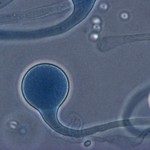Lien vers Pubmed [PMID] – 27252684
Lien DOI – 10.3389/fmicb.2016.00733
Front Microbiol 2016 ; 7(): 733
Pneumocystis jirovecii is an uncultivable fungal pathogen responsible for Pneumocystis pneumonia (PCP) in immunocompromised patients, the physiopathology of which is only partially understood. The diversity of the Pneumocystis strains associated with acute infection has mainly been studied by Sanger sequencing techniques precluding any identification of rare genetic events (< 20% frequency). We used next-generation sequencing to detect minority variants causing infection, and analyzed the complexity of the genomes of infection-causing P. jirovecii. Ultra-deep pyrosequencing (UDPS) of PCR amplicons of two nuclear target region [internal transcribed spacer 2 (ITS2) and dihydrofolate reductase (DHFR)] and one mitochondrial DNA target region [the mitochondrial ribosomal RNA large subunit gene (mtLSU)] was performed on 31 samples from 25 patients. UDPS revealed that almost all patients (n = 23/25, 92%) were infected with mixtures of strains. An analysis of repeated samples from six patients showed that the proportion of each variant change significantly (by up to 30%) over time on treatment in three of these patients. A comparison of mitochondrial and nuclear UDPS data revealed heteroplasmy in P. jirovecii. The recognition site for the homing endonuclease I-SceI was recovered from the mtLSU gene, whereas its two conserved motifs of the enzyme were not. This suggests that heteroplasmy may result from recombination induced by unidentified homing endonucleases. This study sheds new light on the biology of P. jirovecii during infection. PCP results from infection not with a single microorganism, but with a complex mixture of different genotypes, the proportions of which change over time due to intricate selection and reinfection mechanisms that may differ between patients, treatments, and predisposing diseases.



